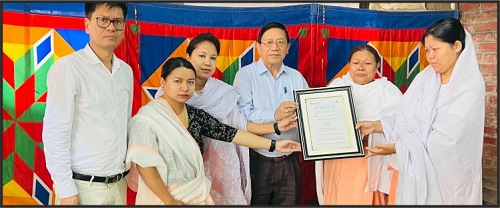Home / Newsletters / ITN 69 / Subscribe
First Ever Deceased Donation in the North East - Manipur
Pallavi Kumar
Indian Transplant Newsletter. 2023 Jul-Sep; 22(2):p6
Print ISSN 0972 - 1568
Online ISSN 3048 - 653X
PDF
On August 02, 2023, history was made when the brave mother and the wife of 42-year-old Sarungbam Kennedy Singh consented to donate his organs, making him the first deceased organ donor, not just in Manipur but in the entire seven North- East states of India.
This was a fruition of close to 5 years of work by the NGO MOHAN Foundation under the “Gift Hope, Gift Life” project supported by the SBI Foundation to initiate deceased organ donations and transplant in the state of Manipur. Organ donation is a crucial aspect of healthcare, and spreading awareness and facilitating procedures in relatively isolated regions can have a significant impact on saving lives.
The collaboration between JNIMS (Jawaharlal Nehru Institute of Medical Sciences), a state government hospital in Imphal, Manipur and MOHAN Foundation, a non-governmental organization (NGO) is indeed a perfect example of a Public-Private-NGO partnership. The partnership involved cooperation between government bodies, private sector entities, and non-profit organizations to address this important societal issue and achieve the common goal of starting transplants and donations. Here's why this collaboration can be seen as an exemplary model:
 Donor family is felicitated with a certificate of appreciation
Donor family is felicitated with a certificate of appreciation
Comprehensive Approach: The partnership covered various aspects of organ donation, including awareness campaigns, training and capacity building, advocacy and most importantly initiating living renal transplants in JNIMS. This holistic approach ensured a well-rounded strategy to tackle the challenges associated with organ donation.
Starting renal transplants in collaboration with a government hospital was a major milestone, as it helps in addressing the growing need for organ transplants in the region, especially for the underprivileged.
Leveraging Resources: Public-Private-NGO partnerships allowed for the pooling of resources from different sectors. The government hospital provided medical infrastructure and expertise, MOHAN Foundation brought in specialized knowledge and community engagement capabilities, and the SBI Foundation contributed towards funding. This collaboration allowed each partner to leverage their strengths for a more effective and
sustainable impact.
Community Involvement: The involvement of an NGO helped bring a community-centric approach to the partnership as NGOs are typically more adept at grassroots-level engagement and can bridge the gap between the government and the local population. This especially becomes crucial in initiatives like organ donation where community awareness and acceptance are pivotal.
The efforts put into creating awareness about organ donation finally lead to a positive change in the community's perception and understanding of the importance of this life-saving practice which finally led to this first landmark donation.
Capacity Building: The focus on training and capacity building in this initiative provided a long-term vision for sustainability for all stakeholders. By transferring skills and knowledge, the partnership aimed not only to address immediate needs like starting transplants but also helped empower healthcare professionals to continue and expand organ donation efforts in the future.
Advocacy and Policy Influence: NGOs can play a very powerful role in advocacy, influencing policies, and shaping public opinion. In this case, the partnership has contributed to the development and enhancement of policies related to organ donation, creating a more conducive environment for the initiative.
Scalability and Replicability: Successful partnerships like these can serve as a model for similar initiatives in other regions. Since the collaboration in Manipur proved successful, it could inspire similar partnerships in different parts of North-East and serve as a model for other regions in the country facing similar challenges in terms of organ donation awareness and infrastructure. MOHAN Foundation has conducted a Feasibility-cum-Assessment study of select hospitals in North-Eastern India for starting deceased organ donation & transplantation programme, which can serve a tool for future direction and focus going forward.
Overall, this collaboration exemplifies the potential impact that can be achieved when different sectors work together synergistically to address complex societal issues. It showcases the diverse strengths that each sector brings to the table, creating a more resilient and comprehensive approach to tackling challenges in healthcare and beyond.
It's a step towards building a more robust and inclusive healthcare system, and the ripple effects of such initiatives can be profound, potentially saving numerous lives in the long run.
Available at:
https://www.itnnews.co.in/indian-transplant-newsletter/issue69/First-Ever-Deceased-Donation-in-the-North-East-Manipur-1253.htm
- Copyright © 2025. Published by MOHAN Foundation
